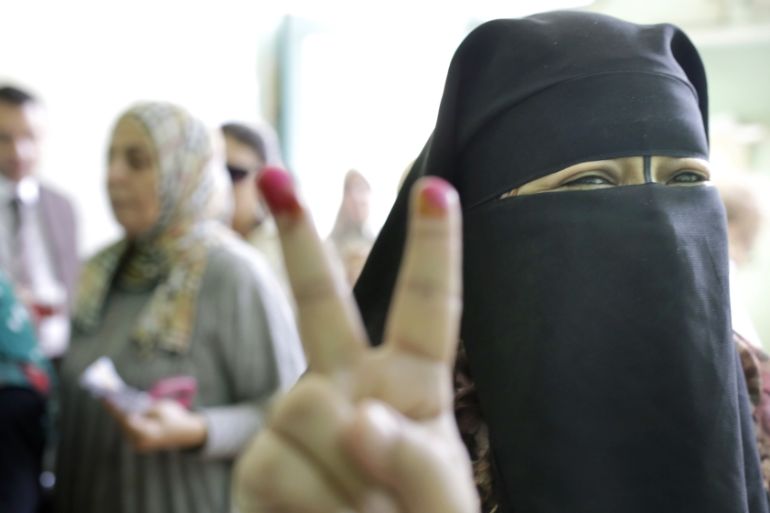Low voter turnout in Egypt amid calls for boycott
Only 10 percent of voters cast ballots on first day of voting in parliamentary election, according to reports.

An estimated 10 percent of eligible voters cast ballots to decide on the make-up of Egypt’s first parliament since the overthrow of former President Mohamed Morsi in 2013, according to news agencies.
|
|
The Electoral Council earlier said turnout had reached 2.27 percent by Sunday afternoon, and a Reuters correspondent at a polling station estimated a turnout of around 10 percent by the end of the day.
Keep reading
list of 4 itemsTurkey and Egypt call for ceasefire in Gaza
Turkey’s Erdogan, Egypt’s Sisi meet in Cairo
Turkey’s Erdogan arrives in Egypt for first visit in more than a decade
The first stage of voting is taking place across 14 of Egypt’s 27 governorates with 27 million people eligible to vote.
The remaining provinces, including Cairo, are set to vote on Monday, with a final run-off expected in December.
Footage broadcast on pro-government TV station CBC showed small crowds of voters gathering outside polling stations in the southern city of Sohag and the northern city of Alexandria.
Turnout was also low among Egyptians voting abroad on Saturday.
HA Hellyer, an associate fellow at the Royal United Services Institute in London and the Brookings Center for Middle East Policy in Washington DC, told Al Jazeera the low turnout was “hardly surprising”.
“The political atmosphere in Egypt, since even before 2013’s military overthrow of Morsi, has been steadily deteriorating. Apathy has set in on the one hand, and there is a crackdown against different types of opposition on the other, ” Hellyer said.
“Parliament technically has a number of powers to act as a check and balance against the executive – but parliament is likely to be fragmented, as well as mainly populated by pro-government forces anyway.”
![Women leave a polling station after casting their ballots in Alexandria [Asmaa Waguih/Reuters]](/wp-content/uploads/2015/10/d556bfd903454c658fe9303f05d785d3_18.jpeg)
‘Impression of democracy’
Egypt’s largest opposition group, Morsi’s banned Muslim Brotherhood, and its allies have called for a boycott of the elections, as have some liberal and leftist activists in the country.
Criticism centres on the idea that the new parliament will be little more than a rubber-stamp body for President Abdel Fattah el-Sisi, who initiated the coup that brought Morsi down.
Most of the 5,000 candidates are supporters of Sisi.
The Muslim Brotherhood’s Mohamed Soudan, now living in exile in the UK, said the elections were designed to give the “impression of democracy”, comparing them to polls that happened under former President Hosni Mubarak.
“Sisi has to implement this kind of election because of Western pressure … the forthcoming parliament will follow all of SCAF’s [Supreme Council of the Armed Forces] orders,” he told Al Jazeera.
“He [Sisi] will use this parliament to approve the 320 laws he issued himself and after that he will dissolve it as he dissolved the 2011 parliament,” Soudan, who was a foreign policy adviser to Morsi, said.
Opposition activist Fatima Said also dismissed the elections as a “sham” similar to those seen under Mubarak.
“The elections are happening amid a climate of severe repression. There is no election; it’s a sham and a futile attempt to try and legitimatise Sisi’s military regime,” she told Al Jazeera from the UK.
OPINION: Revisiting Egypt’s 2013 military takeover
Some prominent Egyptians have been rallying others to participate in the vote, including one of the country’s richest men, Naguib Sawiris, who called the elections a “national duty”.
“In every country in the world, voting in elections is a national duty… so we Egyptians must not fail in this duty,” Sawiris wrote on Twitter.
Security has been stepped up across polling stations amid an ongoing armed campaign by fighters allied to the Islamic State of Iraq and the Levant (ISIL) group, and other opponents of the Egyptian government.
The country has witnessed a strong crackdown on opposition groups following the coup that removed Morsi in 2013.
Thousands of members of Morsi’s Muslim Brotherhood have been imprisoned, and hundreds, including the former president, have been sentenced to death in mass trials.
![Soldiers have been deployed to polling booths amid threats of attack by ISIL-aligned fighters [Amr Nabil/AP]](/wp-content/uploads/2015/10/c00a134c4f6e40c18e130d4268bf026f_18.jpeg)